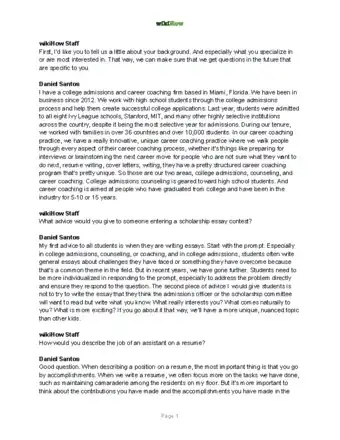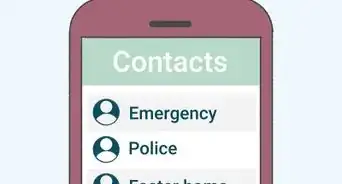This article was co-authored by Daniel Santos. Daniel Santos is a College Admissions & Career Coach and Prepory's co-founder and CEO. Prepory is a leading college admissions consulting firm that has guided over 9,000 students from 35 countries through the US college admissions process. Prepory is a member of the National Association for College Admissions Counseling and a trusted admissions counseling partner to several competitive high schools across Florida. Prior to founding Prepory, Daniel worked at various leading law firms and the United States House of Representatives. Daniel has been featured as a college admissions and career coaching expert across several major publications, including the Wall Street Journal, FORTUNE, and The Harvard Crimson.
There are 22 references cited in this article, which can be found at the bottom of the page.
This article has been viewed 138,809 times.
Somewhere along the line, you may have found your education interrupted by family, work or other responsibilities. That doesn’t mean your college career has to be over. Nowadays, there are more opportunities than ever to go back to school and earn your degree online. If the time has come for you to be a student again, all you have to do is select a school that’s right for you, go through the enrollment process and work your way towards a degree or certification that will help you reach your goals.
Steps
Choosing a School
-
1Decide what you’d like to earn your degree in. Whether you’re pursuing your first degree or returning to academia after a long hiatus, it’s important to have an idea of what you want to study and how it can lead to more prestigious opportunities in the future. Take into account your interests, passions or current line of work. The right degree can act as a stepping stone toward success.[1]
- To become a nurse, for instance, it will be necessary to have a nursing degree, while someone looking to move up in the engineering world may find it useful to study physics or advanced mathematics.
- Focus on schools that are highly-rated for the programs you’re most interested in.
-
2Look at established schools with online programs. Most major universities offer curriculums for students that live out of state or are too busy to attend lectures in person. Signing up for one of these programs will allow you to earn a degree from a prominent accredited school without ever stepping foot in the classroom.[2]
- Not every program or specialization taught at a given school may be available online. Do some research to find out which schools offer the subjects you’re interested in.
- Avoid getting a degree from a for-profit university since they tend to be more focused on recruiting students than the actual academics.
- Major universities will likely have tougher entrance standards, which may be a speed bump for people who are going back to school or have limited college experience.
- A low-residency program might also be an option, if you have the ability to travel or commute periodically. These types of programs involve spending a certain number of hours on campus throughout the course of a semester for special lectures and events and completing the rest of your requirements via distance learning.[3]
Advertisement -
3Consider an online university. There are also a slew of colleges that operate entirely over the internet. With an online school, you’ll have access to assignments, projects and study materials all through your own computer. These sometimes offer courses of study that are hard to find anywhere else, and can make a fine alternative to traditional universities.[4]
- Online universities are becoming more recognized by employers as the technology of education continues to improve.[5]
- Tuition and other expenses will often be much lower for these schools, making them a practical option for those with financial constraints.
-
4Avoid unaccredited schools. To ensure that you stand to receive a quality education (and a useful degree), do some research to find out whether the school you're looking at is a legitimate accredited university or technical school. This can be done by locating the name of the accrediting organization listed on the school's website, then checking that name against the list recognized by the Department of Education. It's a painstaking process, but it's crucial if you want to avoid being deceived.[6]
- Scammer have been known to set up phony schools or degree programs in an effort to separate students from their hard-earned money.[7]
- Attending an accredited university doesn't guarantee more advantages later in life, but it does look better to employers and graduate schools.
-
5Narrow down your options. Once you’ve seen what a few different schools have to offer, prune your list down to the top two or three. Make a note of what impressed you about each program, or how feasible it would be to complete given your schedule and other circumstances. When you’re ready, pick the school that you think will make the best fit for you.[8]
- Some factors to consider when choosing a school to attend online include accreditation, overall cost, the quality of instruction and the ability to transfer existing credits.
- Looking up testimonials from past students who have gotten their degrees from a given school can help you decide whether it would be worth the time and expense to enroll there.[9]
Enrolling as a Student
-
1Fill out an enrollment application. Locate the option to enroll online on the school’s website, then follow the directions you’re given to complete your application. You’ll likely be asked to supply a few pieces of personal information, education and/or employment history and transcripts from previous schools. When you’re finished, send off your application for review.[10]
- Online applications will usually be accompanied by a fee of $30-$60.[11]
- Make sure the information you provide on your application is complete and accurate to the best of your knowledge.
-
2Provide the proper documentation. Along with your transcripts, most schools will ask to hand over a copy of your high school diploma or GED. You might also be expected to furnish one or two additional forms of identification. All of this information will be used to officially cement your status as a student, should you be accepted to the school.[12]
- Recognized forms of ID might include a valid driver’s license, birth certificate, social security card or passport.
- International students will need to be able to show proof of citizenship in the country where they’ll be attending school.[13]
-
3Await your acceptance results. After you’ve sent off your enrollment materials, all that’s left to do is wait. You can typically expect to hear back from the school within 2-4 weeks, though it may take longer depending on how they process applications. In the meantime, be patient and start getting your affairs in order to make room for study time, the cost of textbooks and other considerations.[14]
- If you’ve applied to multiple schools, wait until you get all your results back before coming to a decision.
-
4Pay your tuition. Tuition payments can be made online as soon as you’ve been formally accepted and begun signing up for classes. The amount you owe will be based on the number of courses you take—you can either pay the total sum up front or opt for an installment plan, which most schools offer. Take into account your schedule and funds when planning out your semester.[15]
- Make sure you get your tuition paid in full on time. If you don’t, you won’t be permitted to attend classes.
- Your tuition will be partially determined by whether you’re a part-time or full-time student. Those with busy work schedules or financial restrictions may find it more manageable to work toward their degrees on a part-time basis.[16]
Working Towards Your Degree
-
1Register for the classes you need. Sign up for the courses required to complete your degree, as outlined by the details of your program or specialty track. One advantage of online universities is that they’re usually not limited in terms of class size, which means you won’t have to worry about securing a seat. Try to only take a course load that you know you’ll be able to handle on top of all your other responsibilities.[17]
- At first, you may have to fulfill a few prerequisites, like English composition or college algebra, but once these are out of the way you can proceed to the more specialized coursework you’ll need to complete your program.
- Email your academic adviser (one of these will likely be assigned to you as a new student) or the head of your program to find out what courses you’ll need to take, as well as the best order to take them in.
-
2Study on your own time. As an online student, you’ll still be held to strict due dates, but the time in between will be much more flexible. You might choose to work on your assignments early in the morning, in the evenings before bed or on your days off. Iron out a schedule that’s sustainable and works for you, and stick to it.[18]
- You’ll need to have (or have access to) a working computer with a fast internet connection in order to get your work done on time.
- Since you won’t have the benefit of working in a classroom setting, it can help to set aside a dedicated study space (like a coffee shop or a separate room in your home) to keep you from getting distracted.
-
3Fulfill the necessary academic requirements. Different programs will have different formats, structures and standards. To obtain an undergraduate degree, for example, you’ll be judged on your test scores, essays and grades on weekly assignments, whereas for a master’s or doctoral program you might have to write and defend an in-depth thesis on a certain topic. Be prepared to devote whatever time and effort it takes to meet the demands placed on you as a student.
- Make sure you’re clear starting out about what will be required of you in order to graduate.
- Keep a planner or journal that you can use to record details about major projects, deadlines and holidays.[19]
-
4Earn your degree. After you’ve passed all your courses, successfully completed the requirements of your program and applied to graduate, you’ll be awarded your degree. Be proud of your accomplishments! The pursuit of higher education is a noble goal, and one that allows you to shape a brighter future for yourself.
Community Q&A
-
QuestionCan I get an online degree from overseas?
 Community AnswerYes, if the educational institute offers external courses and allows you to do so. It varies, however.
Community AnswerYes, if the educational institute offers external courses and allows you to do so. It varies, however. -
QuestionWhat subjects are needed to become a primary school math teacher?
 Community AnswerThis will depend largely on the education requirements of the schools in your area, but will usually entail extensive study of mathematics and experience in early childhood education.
Community AnswerThis will depend largely on the education requirements of the schools in your area, but will usually entail extensive study of mathematics and experience in early childhood education. -
QuestionWhat is a six year degree?
 Community AnswerA six year degree is any program or track that is estimated to take 5-6 years to complete. Examples of these types of degrees include most master's programs, including but not limited to natural science, law and medical/pre-med degrees.
Community AnswerA six year degree is any program or track that is estimated to take 5-6 years to complete. Examples of these types of degrees include most master's programs, including but not limited to natural science, law and medical/pre-med degrees.
Expert Interview

Thanks for reading our article! If you'd like to learn more about pursuing a degree online, check out our in-depth interview with Daniel Santos.
References
- ↑ https://www.usnews.com/education/online-education/articles/2014/03/03/6-great-jobs-you-can-get-with-an-online-degree
- ↑ http://www.bestcolleges.com/features/top-online-schools/
- ↑ http://observer.com/2015/11/the-rise-of-low-residency-programs/
- ↑ http://www.straighterline.com/blog/choose-accredited-online-college-10-easy-steps/
- ↑ http://edition.cnn.com/2010/LIVING/worklife/03/29/cb.employers.online.education/
- ↑ https://www.usnews.com/education/online-education/articles/2013/10/16/how-to-tell-if-an-online-program-is-accredited
- ↑ http://www.distancelearningportal.com/articles/175/how-to-know-if-an-online-degree-is-a-scam-or-the-real-deal.html
- ↑ http://www.collegexpress.com/articles-and-advice/admission/blog/7-ways-narrow-down-your-list-college-choices/
- ↑ http://www.ucdenver.edu/academics/CUOnline/OnlineCourses/Selecting-a-University/Pages/How-To-Choose-An-Online-University.aspx
- ↑ https://www.princetonreview.com/college-advice/college-application
- ↑ https://bigfuture.collegeboard.org/get-in/applying-101/quick-guide-the-anatomy-of-the-college-application
- ↑ https://www.wgu.edu/admissions/requirements
- ↑ https://www.thoughtco.com/proof-of-u-s-citizenship-3321592
- ↑ https://admissions.arizona.edu/faqs/freshman
- ↑ https://bigfuture.collegeboard.org/pay-for-college/paying-your-share/college-tuition-payment-plans
- ↑ https://www.geteducated.com/elearning-education-blog/7-tips-for-success-in-online-courses/
- ↑ https://bigfuture.collegeboard.org/find-colleges/academic-life/8-tips-for-choosing-college-classes
- ↑ https://elearningindustry.com/10-study-tips-for-online-learners-getting-the-most-out-of-your-elearning-course
- ↑ http://mostlymorgan.com/collegiates-guide-planner/
- ↑ https://www.themuse.com/advice/how-to-and-how-not-to-list-education-on-your-resume
- ↑ http://www.huffingtonpost.com/uloop/9-reasons-to-pursue-a-masters-degree_b_4097366.html
- ↑ https://www.usnews.com/education/online-education/articles/2016-05-23/5-things-to-know-about-financial-aid-in-online-degree-programs
About This Article
To get a degree online, research on the internet to find an online course in the subject you want to study. For example, you might be able to study at an established university that offers online courses for out of state students. Alternatively, try exploring what online universities have to offer. However, you should avoid applying to non-accredited schools to make sure you get a good quality education. Once you've found a few options, narrow them down by reviewing testimonials from past students, the cost of instruction, and the quality of the teaching staff. For tips on how to pay your tuition fees and how to avoid enrolling in an unaccredited college, read on!

































































